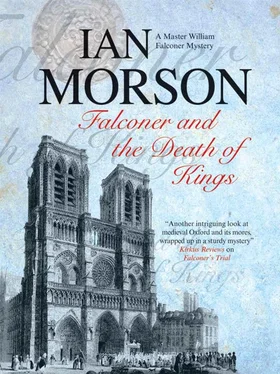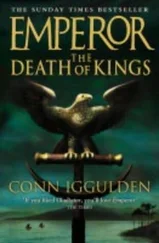Ian Morson - Falconer and the Death of Kings
Здесь есть возможность читать онлайн «Ian Morson - Falconer and the Death of Kings» весь текст электронной книги совершенно бесплатно (целиком полную версию без сокращений). В некоторых случаях можно слушать аудио, скачать через торрент в формате fb2 и присутствует краткое содержание. Год выпуска: 2010, Издательство: Severn House Publishers, Жанр: Исторический детектив, на английском языке. Описание произведения, (предисловие) а так же отзывы посетителей доступны на портале библиотеки ЛибКат.
- Название:Falconer and the Death of Kings
- Автор:
- Издательство:Severn House Publishers
- Жанр:
- Год:2010
- ISBN:нет данных
- Рейтинг книги:5 / 5. Голосов: 1
-
Избранное:Добавить в избранное
- Отзывы:
-
Ваша оценка:
- 100
- 1
- 2
- 3
- 4
- 5
Falconer and the Death of Kings: краткое содержание, описание и аннотация
Предлагаем к чтению аннотацию, описание, краткое содержание или предисловие (зависит от того, что написал сам автор книги «Falconer and the Death of Kings»). Если вы не нашли необходимую информацию о книге — напишите в комментариях, мы постараемся отыскать её.
Falconer and the Death of Kings — читать онлайн бесплатно полную книгу (весь текст) целиком
Ниже представлен текст книги, разбитый по страницам. Система сохранения места последней прочитанной страницы, позволяет с удобством читать онлайн бесплатно книгу «Falconer and the Death of Kings», без необходимости каждый раз заново искать на чём Вы остановились. Поставьте закладку, и сможете в любой момент перейти на страницу, на которой закончили чтение.
Интервал:
Закладка:
‘Come, eat, Edward. You look somewhat pale.’
Charles’s loud and stentorian voice dragged him back to the present. But not soon enough to prevent a shudder of horror racking his body as he recalled the attack and the subsequent butchery perpetrated on his body. Eleanor, his wife who sat at his side, knew what was troubling him. She gently squeezed his arm — the one that still bore the scars of his surgeon’s work — and slid a bread trencher in front of him.
‘The crane is a delicious and delicate meat, darling. I will eat some too.’
She slid her hand from his arm and touched her belly. He wondered if she was pregnant again. God knows, she was often enough. Edward counted up the score in his head. In the last eighteen years, Eleanor had given him eight children. And five were already dead, including his eldest son and one-time heir, John. Little Joan had been born in Acre and was not yet a year old. Could she be with child again? The trouble was, she was irresistible. He touched her golden hair, neatly arranged under her fashionable snood. Soon enough he would see it loosened and spread across their pillow. His loins stirred, and he squirmed in his seat. Eleanor’s big blue eyes, at once all innocence and knowingness, stared at him. She could always read his mind, and pursed her full, red lips in mock disapproval of his errant thoughts. She pushed a serving of white meat at him.
‘Crane, my dear. And try one of these coffins.’
Edward blanched a little at being offered the hard, crusty pastry. He had only just heard of the death of his father, Henry, and the thought of coffins did not sit well with his stomach. He was not yet used to the idea of being the King of England himself. For all his life, his father had been the king. It was a given, an immovable star in his firmament. Now his father lay in a coffin, and Edward was king. The thought, and that of Eleanor naked on their bed later, made him feel a lot better. He smiled and took a piece of crane in his mouth from Eleanor’s slender fingers, kissing the tips as he did so.
TWO
Oxford
That winter was a harsh one, with blizzards often cutting Oxford off from its surroundings. Many people, fearful of starving, moved from the frozen countryside into the shanty-town outskirts just below the walls. Some, like the recently widowed Sir Humphrey Segrim, stuck it out in their manor houses. Burning precious stocks of wood, Segrim brooded over the murder of his wife, Ann, and huddled deeper under his fur robes. He had never really got along with his wife. She had ideas that she was better than him — ideas put in her head by that master at the university. But now she was gone, he missed her company. He could not fault her dutiful nature as mistress of the house. Nor could he quite put out of his mind the suspicion that she had had an affair with William Falconer. When her body had been found with the man kneeling beside it, he had been sure that he had killed her. Falconer’s trial had been a farce, however, and the regent master had been exonerated. But Segrim still harboured doubts about the real killer. And they grew in his isolation at Botley Manor all through the winter and into the cold New Year.
The object of Sir Humphrey Segrim’s misgivings was having a cold, miserable winter of it too. The Christmas celebrations at the university had failed to cheer him up due to the continued absence of Saphira. Even the antics of the King of Misrule — the youngest clerk at the university elected for a brief few days of sovereignty — seemed cheerless. The new chancellor, William de Bosco, stoically bore his time in the stocks at Carfax, and carols mingled in the darkening streets each evening with love songs, and tales of Nebuchadnezzar, and Pyramus and Thisbe. But for William, holed up in his attic solar in Aristotle’s Hall, his acrimonious parting with Saphira rankled. More so, because he could not work out what he had said that was wrong. Whatever she thought, he could not give up his post as regent master, which he would have to do if he was to share his life openly with her. A master who married forfeited his degree. Yet all he had suggested was that she owed him some obligations. What was wrong in that? His fevered brain was cut in on by a sudden burst of singing from the main hall of the lodgings. Those students who had not gone home for Christmas, or who had been trapped by the snow in Oxford, were enjoying themselves around the communal fire below. Falconer listened to the words, sung off-key by Peter Mithian:
‘Make we merry in hall and bower
This time was born our Saviour.’
Irritated by the happiness inherent in the singing, he called out down the stairs to those below.
‘It is a week since Christmas, and the New Year is upon us. I want some peace, and you should be studying.’
The sudden silence was palpable, and Falconer immediately regretted his outburst. He was becoming just like one of those pompous and solemn masters he ridiculed in his schools every day. Glumly, he wrapped his blanket around him and stared at Balthazar in the corner of the room. The snowy-white barn owl stared back at him unblinkingly, then, with a silent flap of his wings, flew out of the window and into the darkness. Falconer hunched even lower into his blanket and muttered an imprecation.
‘Even you desert me, bird, and leave me to my misery.’
The Feast Day of St Peter of Canterbury, the Sixth Day of January 1273
It was the week following Falconer’s uncharacteristic outburst that he received a cryptic message from France. He was teaching his students in a chilly hall in Schools Lane that a small fire was failing to heat adequately. Falconer was pacing around the room, in part to keep warm, and throwing questions at the young men who sat on benches before him. Recently, the faces before him had become a uniform blur that had nothing to do with his short-sightedness. He was finding it increasingly difficult to distinguish one young clerk from another, and one year from another. He tried to rally his enthusiasm. The text being studied was Aristotle’s Metaphysics , and the boys were struggling. Falconer returned to basics and picked out one boy he did know.
‘Peter, tell us about Aquinas’s interpretation of Aristotle when it comes to natural law.’
The older Mithian brother grinned. He was on safe ground here.
‘Aquinas says that natural law is based on first principles and that the first precept of the law is that good is to be done and promoted, and evil is to be avoided.’
He turned to his fellow students in triumph. His teacher, however, was not so impressed. He knew the boy was reciting something he had learned by rote. So much teaching was done this way at the university, and it frustrated him. He threw out a challenge with more of Aquinas’s thinking.
‘He also says that the desires to live and to procreate are among the most basic human values.’
The young men giggled at the thought of procreation, a concept that was often on their minds. Especially after a night spent in a local tavern drinking ale. Then a steady voice spoke up from the shadows near the street door.
‘Aquinas also says that the goal of human existence is union and eternal fellowship with God.’
Under his breath, Falconer groaned. He knew that voice.
‘Brother John Pecham, come close to the fire and tell us about your work on optics.’
The Franciscan who stepped into the yellow candlelight of the schoolroom was a small and wiry man with a strict tonsure and an even stricter-looking face. Everything about him suggested cleanliness, and even the hem of his grey habit seemed untouched by the dirty slush outside the door. He shook his head at Falconer’s invitation, knowing he was being diverted from his religious teaching deliberately. Pecham was a deeply pious man, but he also subscribed to a belief in the value of experimental science. His field was that of optics and astronomy.
Читать дальшеИнтервал:
Закладка:
Похожие книги на «Falconer and the Death of Kings»
Представляем Вашему вниманию похожие книги на «Falconer and the Death of Kings» списком для выбора. Мы отобрали схожую по названию и смыслу литературу в надежде предоставить читателям больше вариантов отыскать новые, интересные, ещё непрочитанные произведения.
Обсуждение, отзывы о книге «Falconer and the Death of Kings» и просто собственные мнения читателей. Оставьте ваши комментарии, напишите, что Вы думаете о произведении, его смысле или главных героях. Укажите что конкретно понравилось, а что нет, и почему Вы так считаете.












